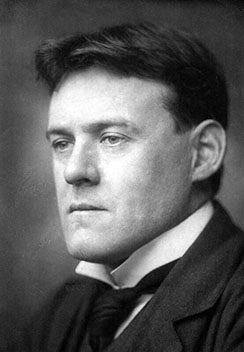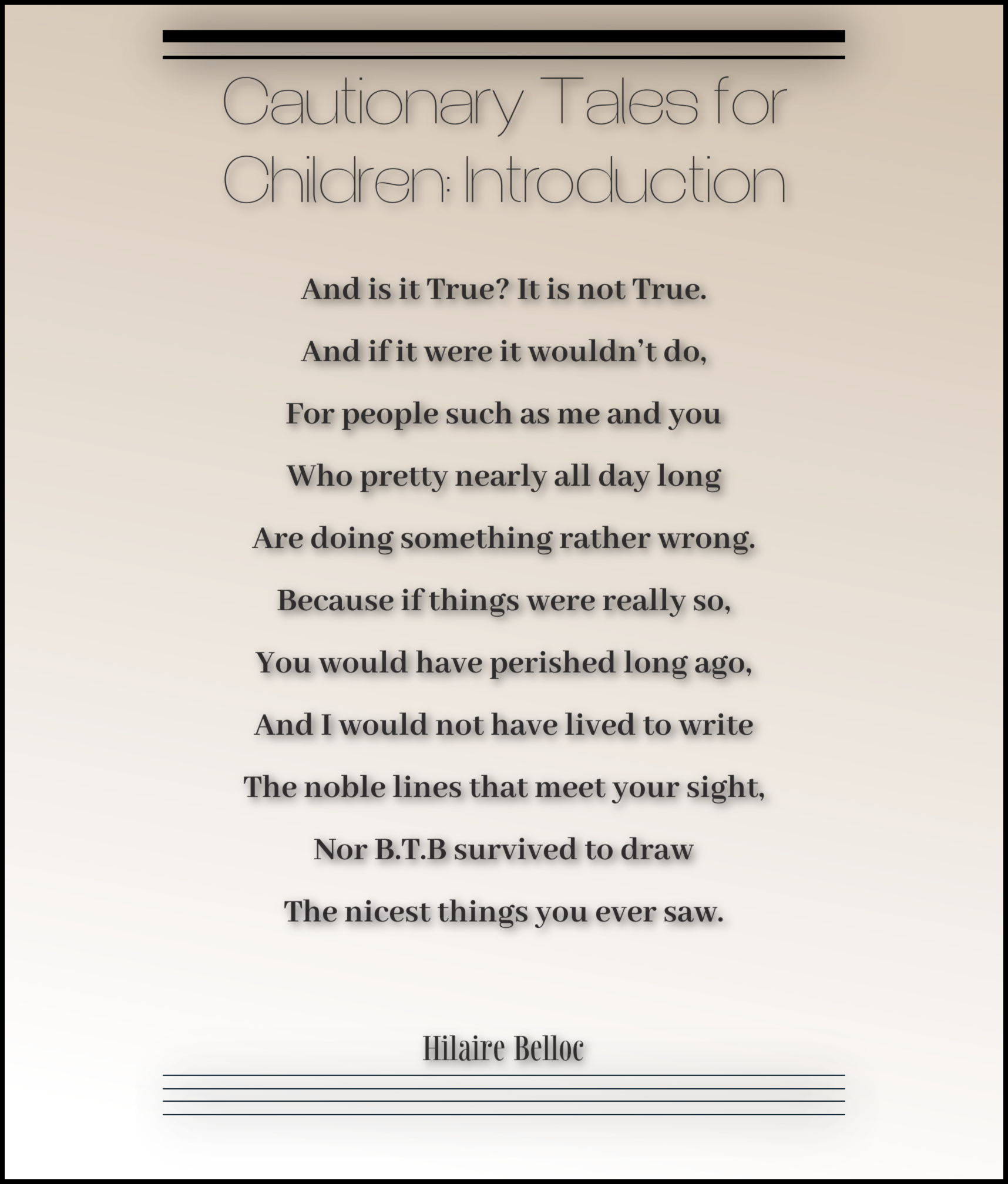
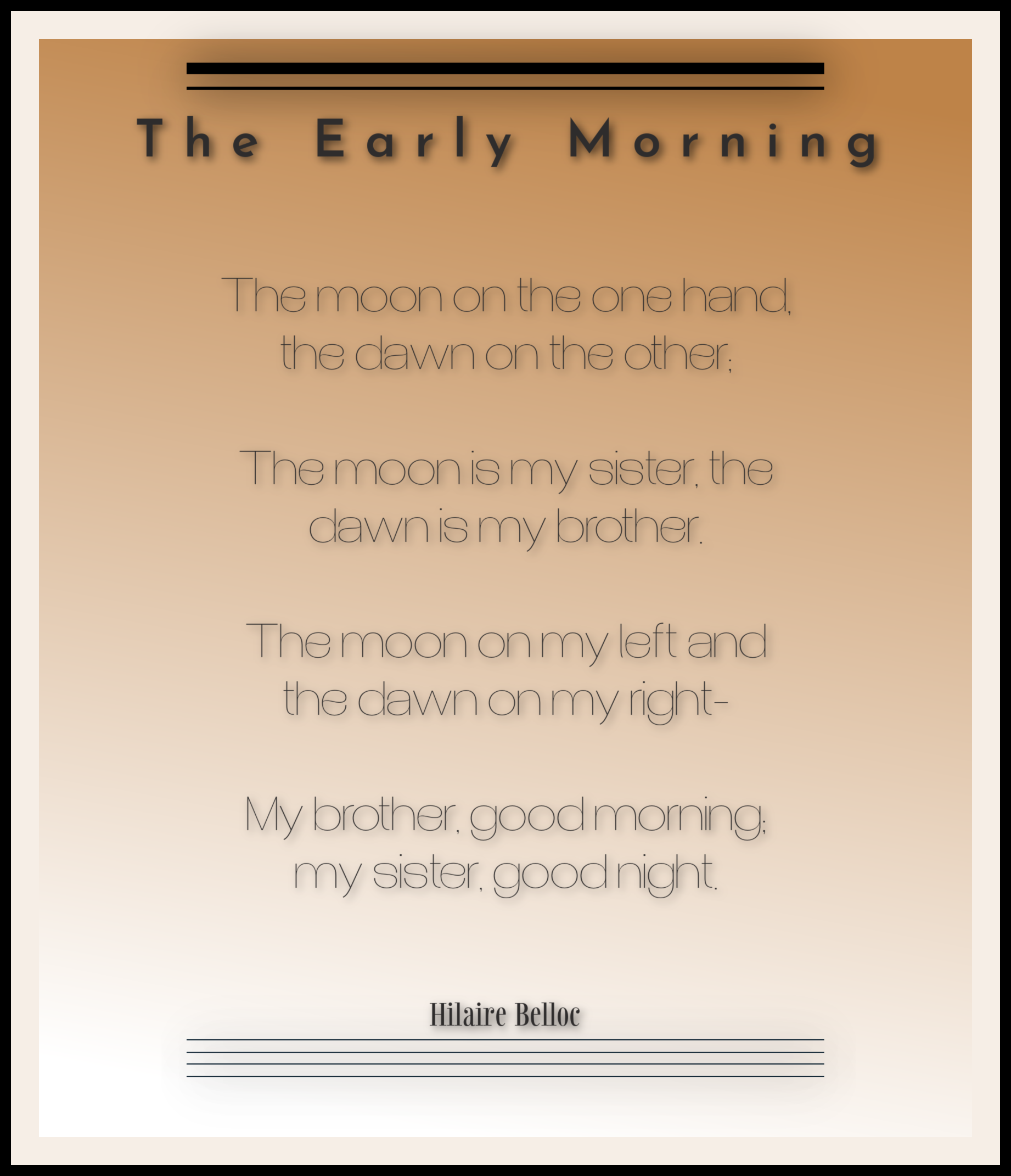
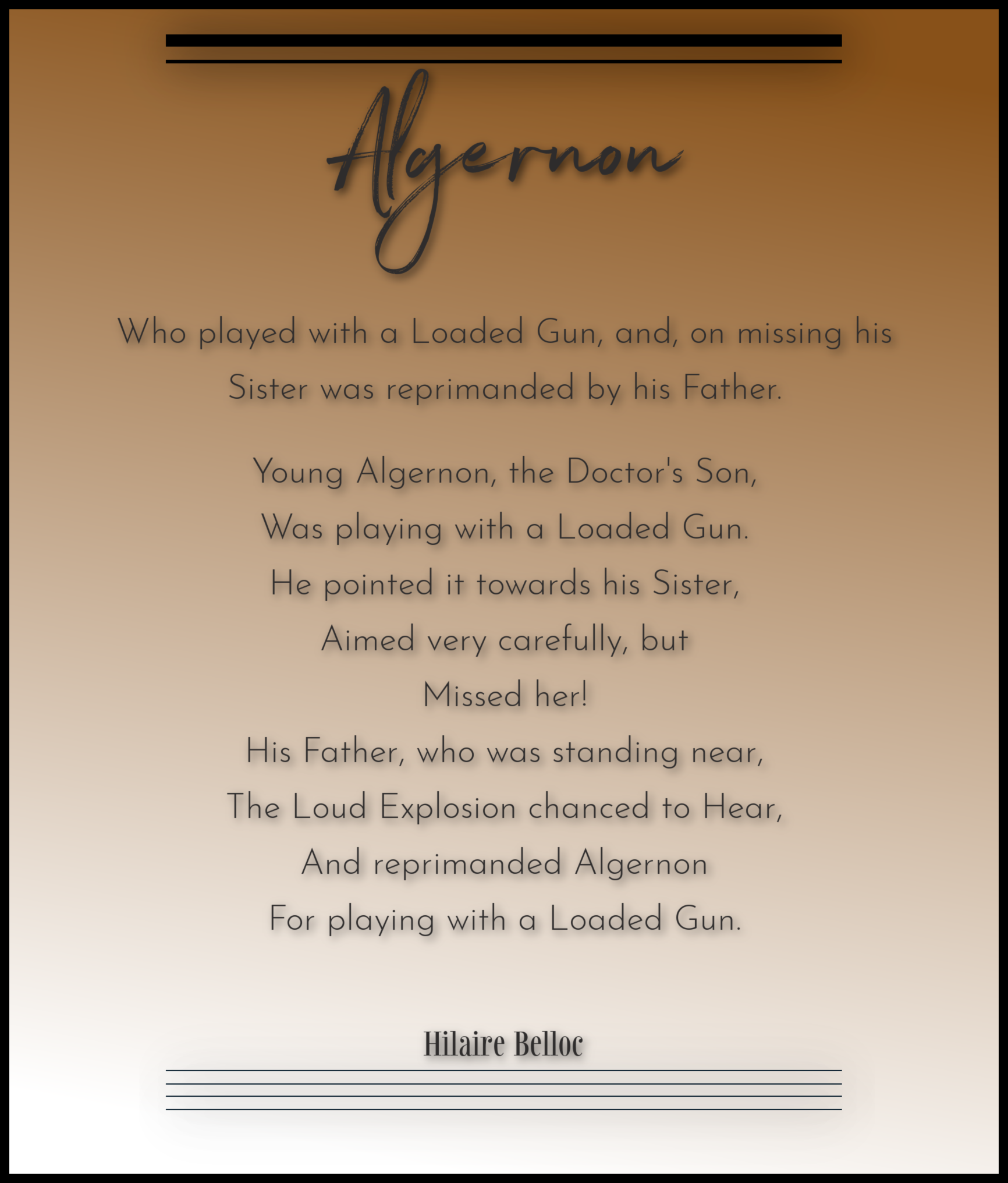
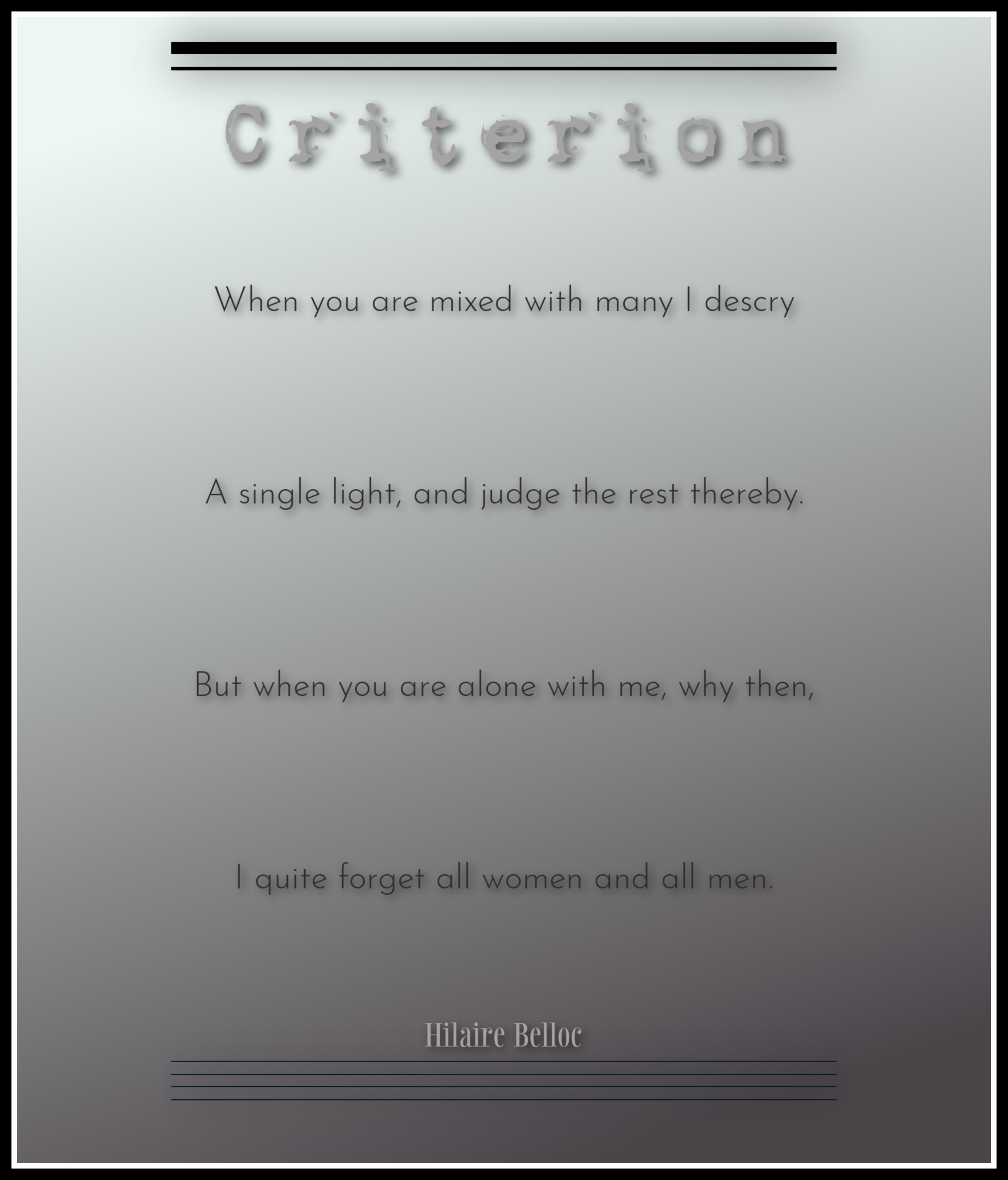
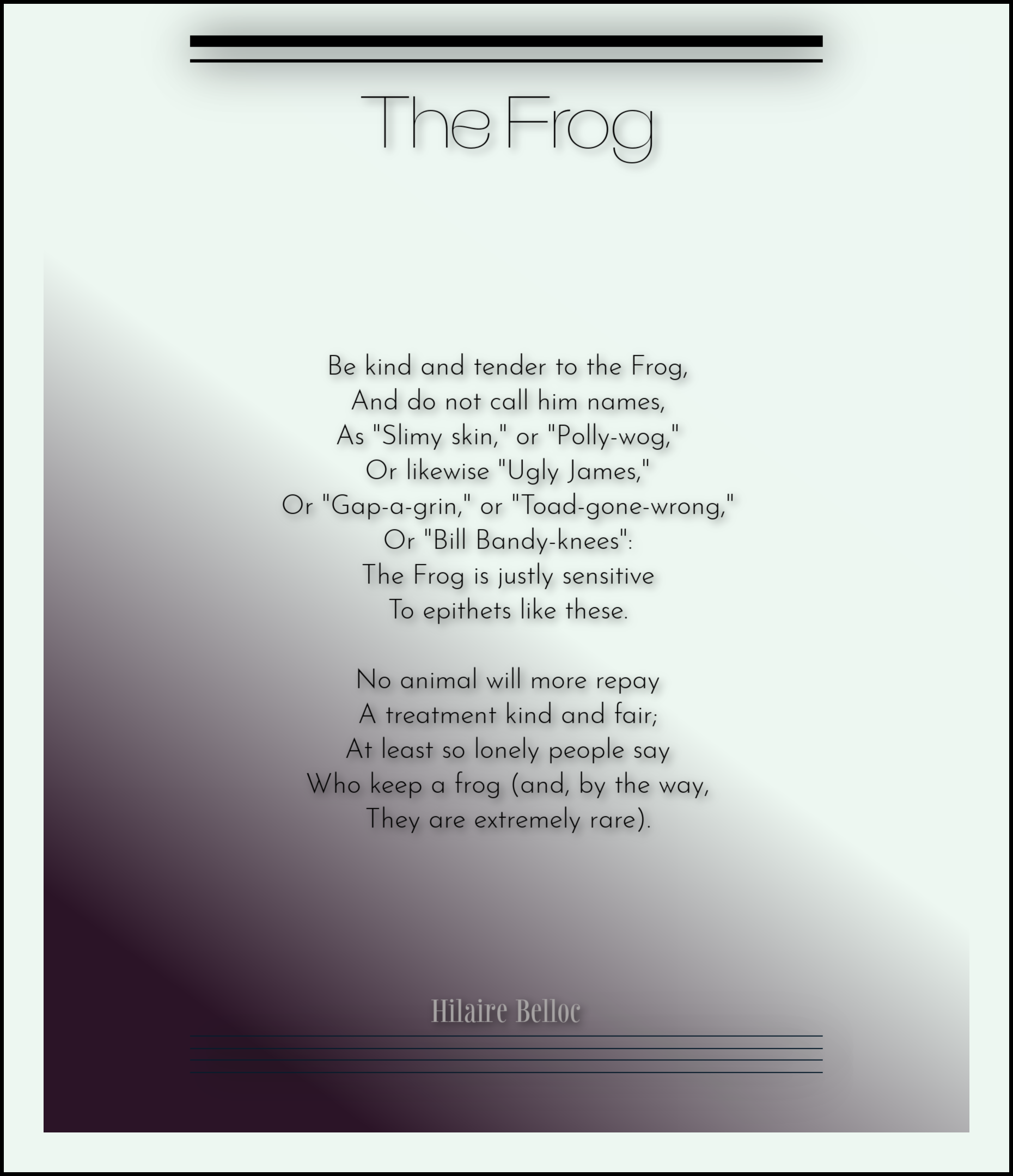
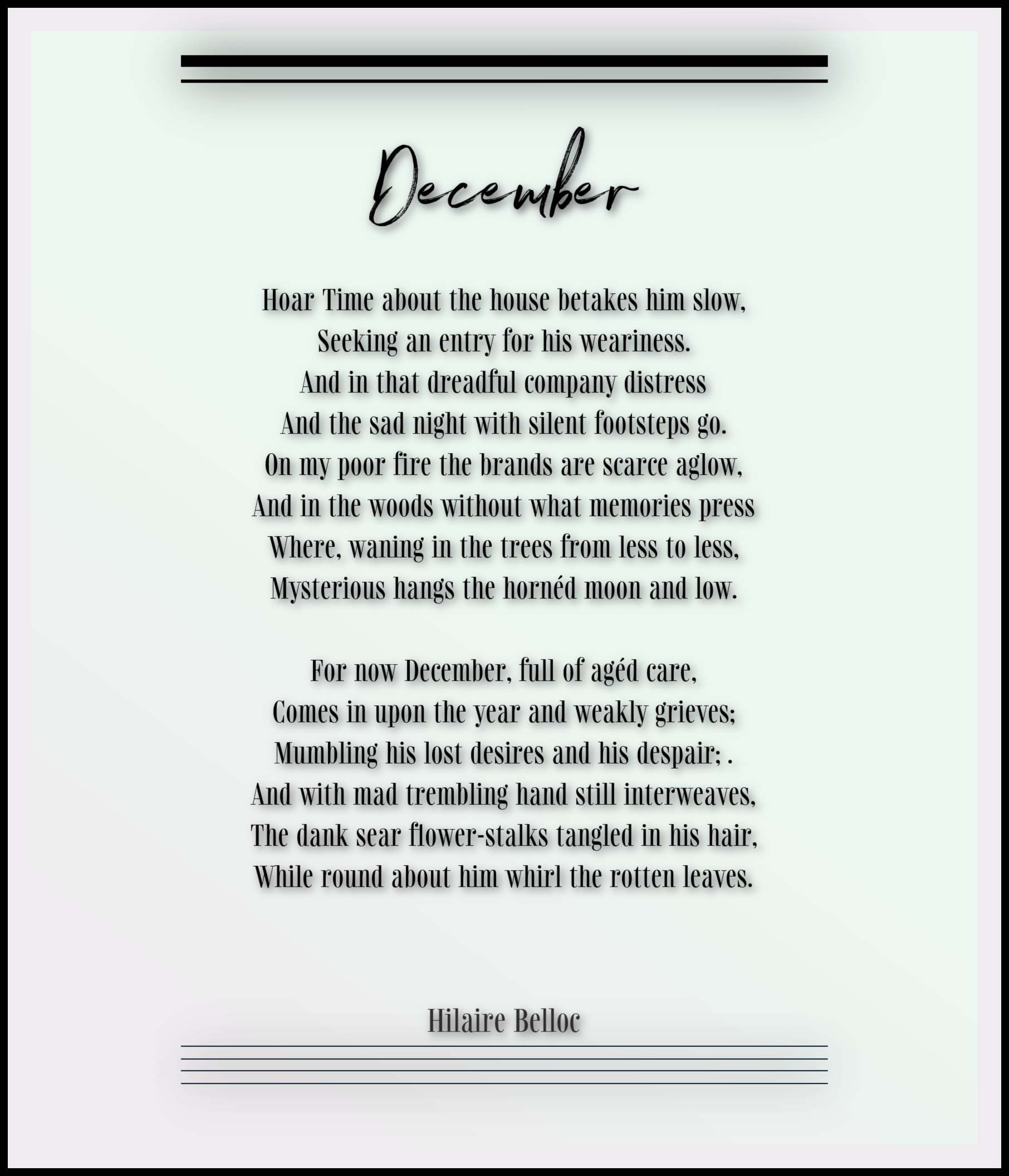
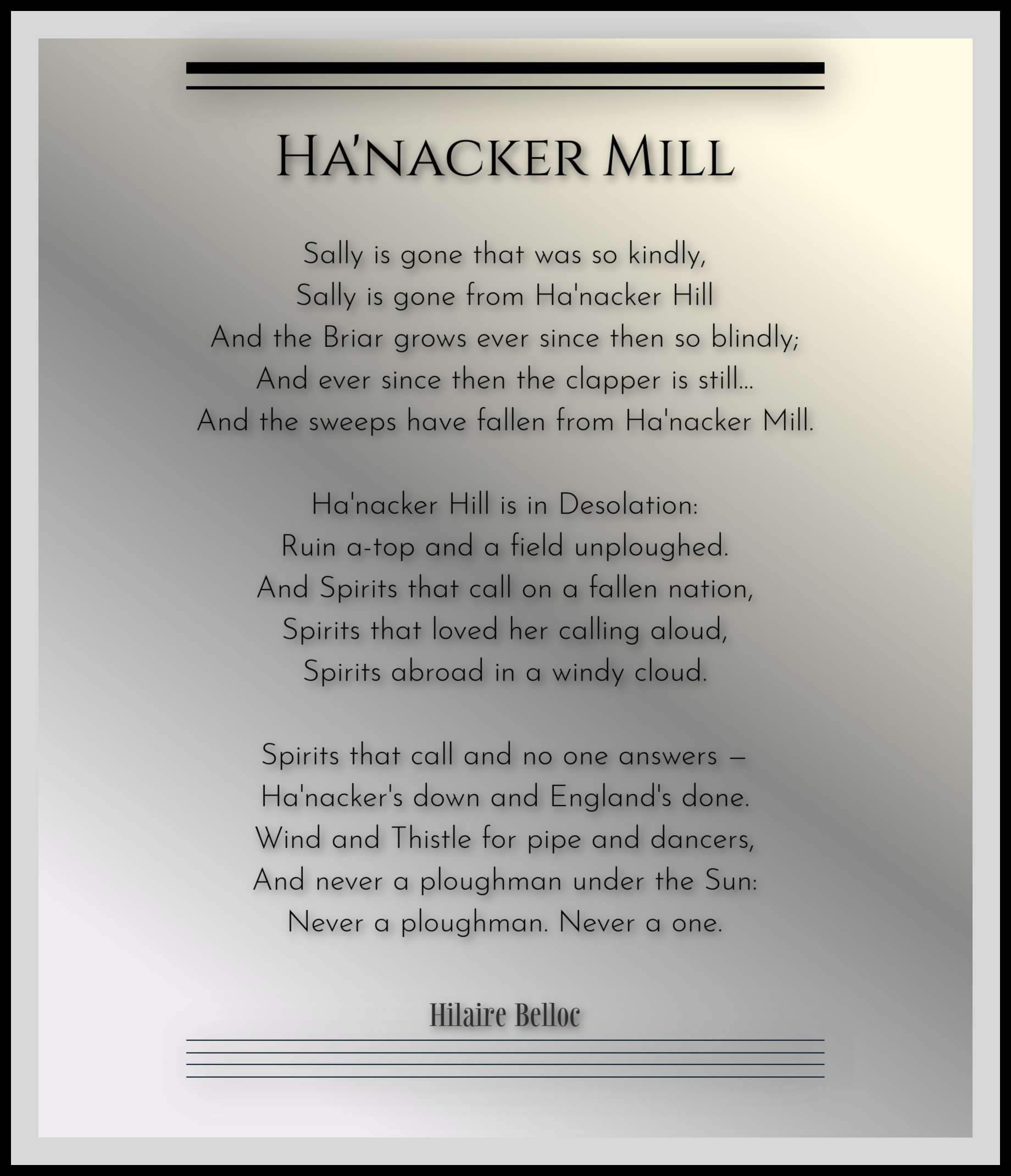
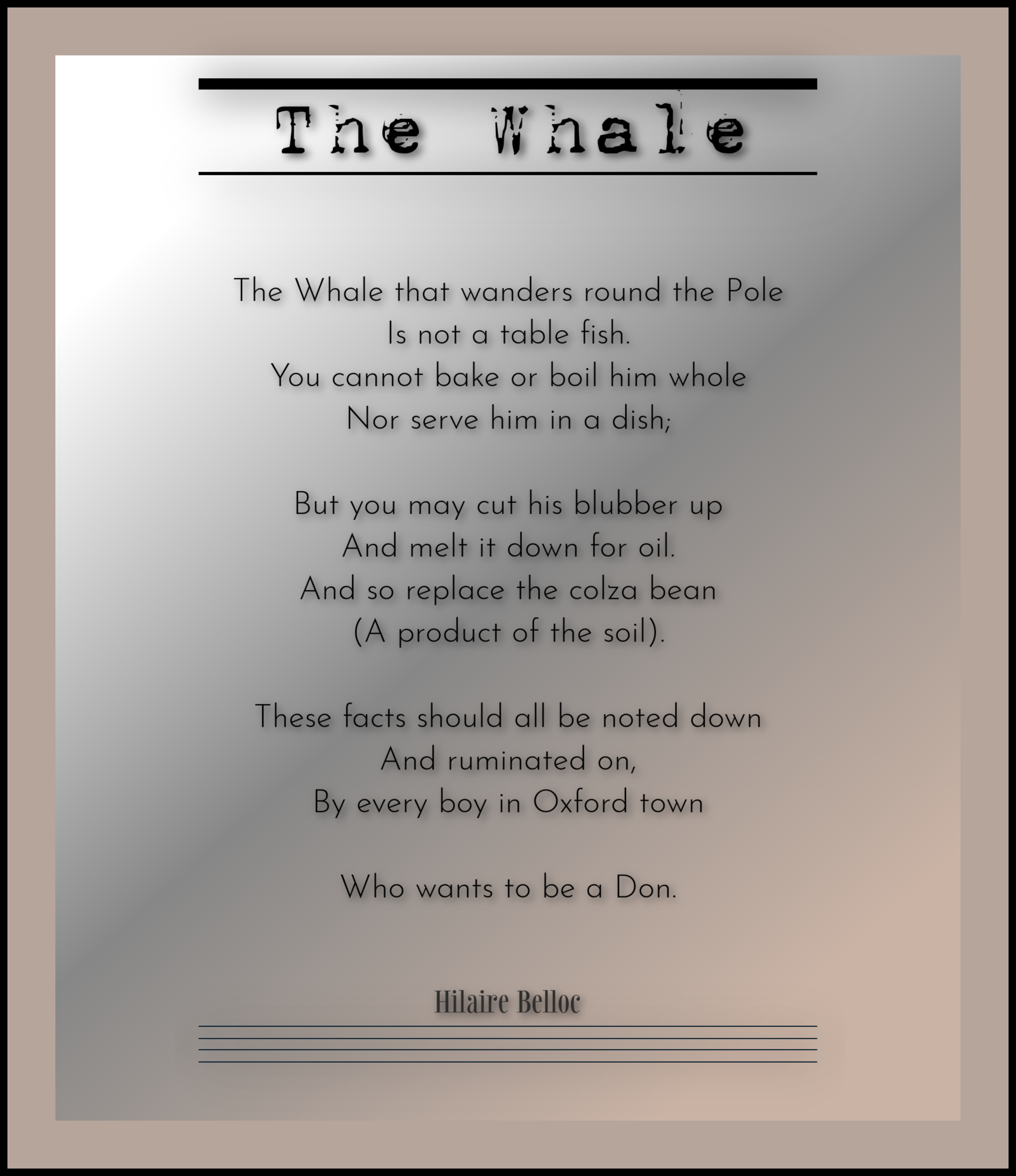
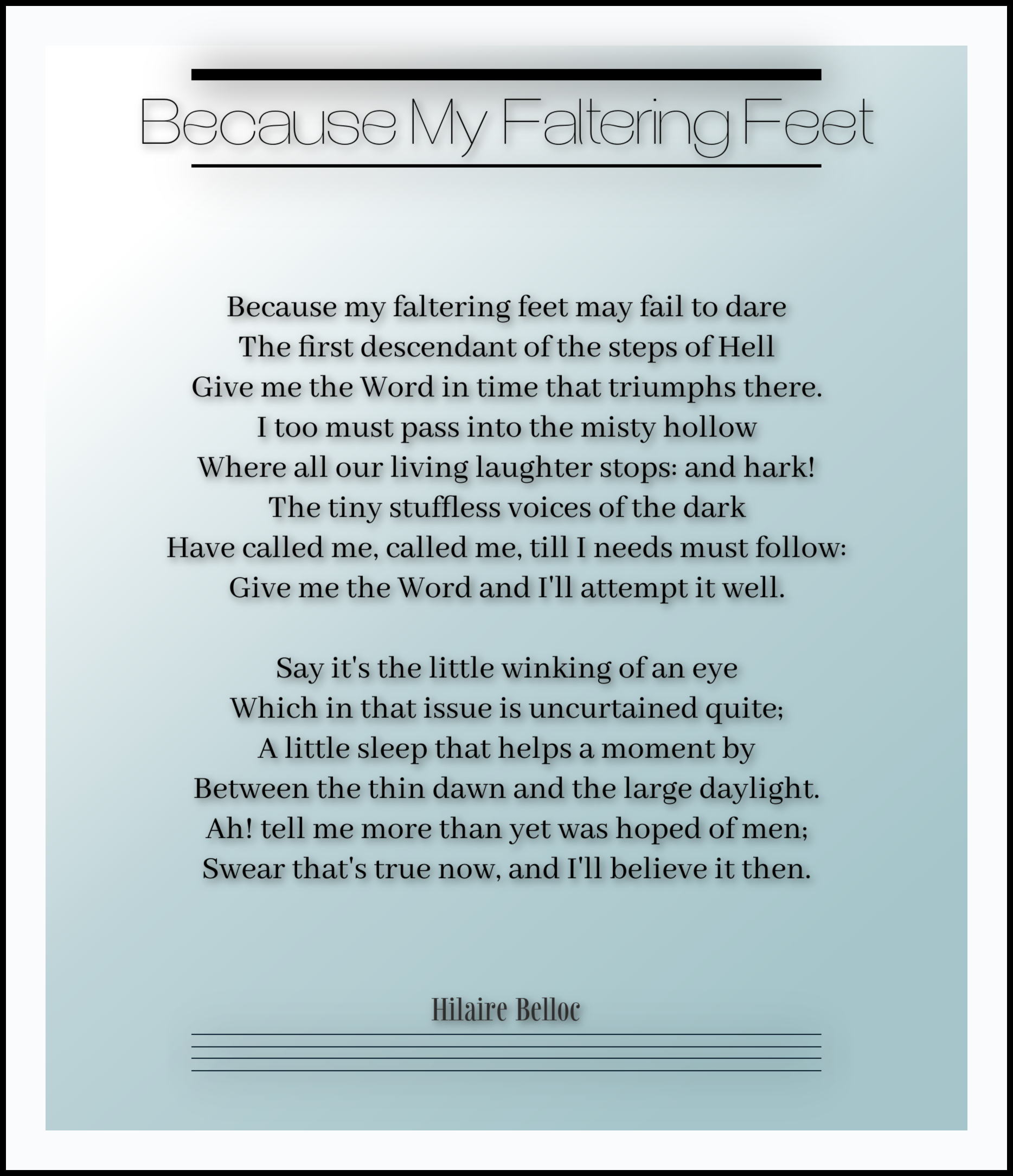
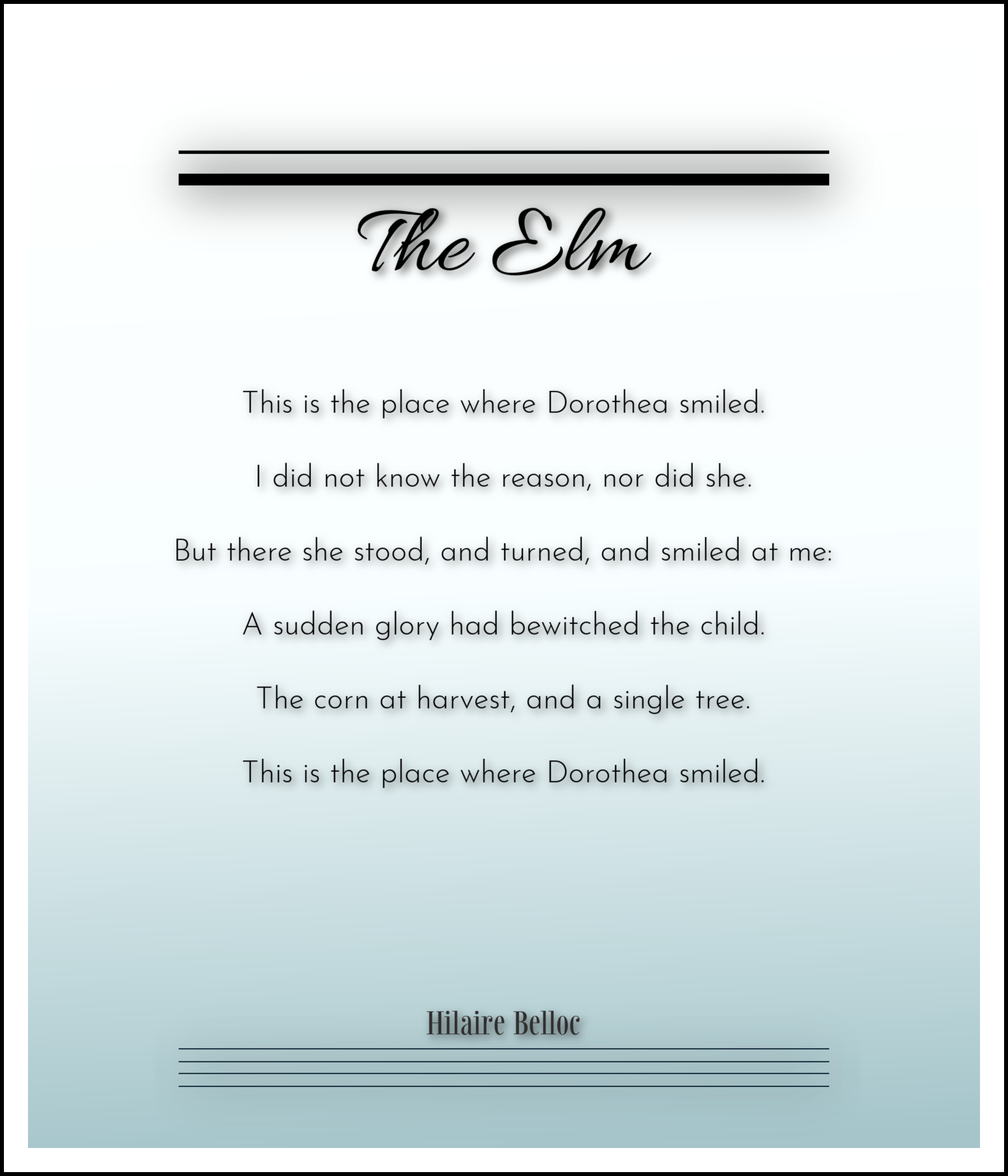
The Elm
This is the place where Dorothea smiled.
I did not know the reason, nor did she.
But there she stood, and turned, and smiled at me:
A sudden glory had bewitched the child.
The corn at harvest, and a single tree.
This is the place where Dorothea smiled.
The Yak
As a friend to the children commend me the Yak.
You will find it exactly the thing:
It will carry and fetch, you can ride on its back,
Or lead it about with a string.
The Tartar who dwells on the plains of Thibet
(A desolate region of snow)
Has for centuries made it a nursery pet.
And surely the Tartar should know!
Then tell your papa where the Yak can be got,
And if he is awfully rich
He will buy you the creature - or else he will not.
(I cannot be positive which.)
The Diamond
This diamond, Juliet, will adorn
Ephemeral beauties yet unborn.
While my strong verse, for ever new,
Shall still adorn immortal you.
The Microbe
The Microbe is so very small
You cannot make him out at all,
But many sanguine people hope
To see him through a microscope.
His jointed tongue that lies beneath
A hundred curious rows of teeth;
His seven tufted tails with lots
Of lovely pink and purple spots,
On each of which a pattern stands,
Composed of forty separate bands;
His eyebrows of a tender green;
All these have never yet been seen—
But Scientists, who ought to know,
Assure us that they must be so….
Oh! let us never, never doubt
What nobody is sure about!
The Vulture
The Vulture eats between his meals,
And that's the reason why
He very, very, rarely feels
As well as you and I.
His eye is dull, his head is bald,
His neck is growing thinner.
Oh! what a lesson for us all
To only eat at dinner!
The Elephant
When people call this beast to mind,
They marvel more and more
At such a little tail behind,
So large a trunk before.
Matilda Who told Lies, and was Burned to Death
Matilda told such Dreadful Lies,
It made one Gasp and Stretch one's Eyes;
Her Aunt, who, from her Earliest Youth,
Had kept a Strict Regard for Truth,
Attempted to Believe Matilda:
The effort very nearly killed her,
And would have done so, had not She
Discovered this Infirmity.
For once, towards the Close of Day,
Matilda, growing tired of play,
And finding she was left alone,
Went tiptoe to the Telephone
And summoned the Immediate Aid
Of London's Noble Fire-Brigade.
Within an hour the Gallant Band
Were pouring in on every hand,
From Putney, Hackney Downs, and Bow.
With Courage high and Hearts a-glow,
They galloped, roaring through the Town,
'Matilda's House is Burning Down!'
Inspired by British Cheers and Loud
Proceeding from the Frenzied Crowd,
They ran their ladders through a score
Of windows on the Ball Room Floor;
And took Peculiar Pains to Souse
The Pictures up and down the House,
Until Matilda's Aunt succeeded
In showing them they were not needed;
And even then she had to pay
To get the Men to go away,
It happened that a few Weeks later
Her Aunt was off to the Theatre
To see that Interesting Play
The Second Mrs. Tanqueray.
She had refused to take her Niece
To hear this Entertaining Piece:
A Deprivation Just and Wise
To Punish her for Telling Lies.
That Night a Fire did break out--
You should have heard Matilda Shout!
You should have heard her Scream and Bawl,
And throw the window up and call
To People passing in the Street--
(The rapidly increasing Heat
Encouraging her to obtain
Their confidence) -- but all in vain!
For every time she shouted 'Fire!'
They only answered 'Little Liar!'
And therefore when her Aunt returned,
Matilda, and the House, were Burned.
Rebecca Who Slammed Doors for
Fun and Perished Miserably
A trick that everyone abhors
In little girls is slamming doors.
A wealthy banker's little daughter
Who lived in Palace Green, Bayswater
(By name Rebecca Offendort),
Was given to this furious sport.
She would deliberately go
And slam the door like billy-o!
To make her Uncle Jacob start.
She was not really bad at heart,
But only rather rude and wild;
She was an aggravating child…
It happened that a marble bust
Of Abraham was standing just
Above the door this little lamb
Had carefully prepared to slam,
And down it came! It knocked her flat!
It laid her out! She looked like that.
Her funeral sermon (which was long
And followed by a sacred song)
Mentioned her virtues, it is true,
But dwelt upon her vices too,
And showed the dreadful end of one
Who goes and slams the door for fun.
The children who were brought to hear
The awful tale from far and near
Were much impressed, and inly swore
They never more would slam the door,
— As often they had done before.
Jim
There was a Boy whose name was Jim;
His Friends were very good to him.
They gave him Tea, and Cakes, and Jam,
And slices of delicious Ham,
And Chocolate with pink inside
And little Tricycles to ride,
And read him Stories through and through,
And even took him to the Zoo—
But there it was the dreadful Fate
Befell him, which I now relate.
You know—or at least you ought to know,
For I have often told you so—
That Children never are allowed
To leave their Nurses in a Crowd;
Now this was Jim's especial Foible,
He ran away when he was able,
And on this inauspicious day
He slipped his hand and ran away!
He hadn't gone a yard when—Bang!
With open Jaws, a lion sprang,
And hungrily began to eat
The Boy: beginning at his feet.
Now, just imagine how it feels
When first your toes and then your heels,
And then by gradual degrees,
Your shins and ankles, calves and knees,
Are slowly eaten, bit by bit.
No wonder Jim detested it!
No wonder that he shouted ``Hi!''
The Honest Keeper heard his cry,
Though very fat he almost ran
To help the little gentleman.
``Ponto!'' he ordered as he came
(For Ponto was the Lion's name),
``Ponto!'' he cried, with angry Frown,
``Let go, Sir! Down, Sir! Put it down!''
The Lion made a sudden stop,
He let the Dainty Morsel drop,
And slunk reluctant to his Cage,
Snarling with Disappointed Rage.
But when he bent him over Jim,
The Honest Keeper's Eyes were dim.
The Lion having reached his Head,
The Miserable Boy was dead!
When Nurse informed his Parents, they
Were more Concerned than I can say:—
His Mother, as She dried her eyes,
Said, ``Well—it gives me no surprise,
He would not do as he was told!''
His Father, who was self-controlled,
Bade all the children round attend
To James's miserable end,
And always keep a-hold of Nurse
For fear of finding something worse.
Cautionary Tales for Children: Introduction
And is it True? It is not True.
And if it were it wouldn’t do,
For people such as me and you
Who pretty nearly all day long
Are doing something rather wrong.
Because if things were really so,
You would have perished long ago,
And I would not have lived to write
The noble lines that meet your sight,
Nor B.T.B survived to draw
The nicest things you ever saw.
Tarantella
Do you remember an Inn, Miranda?
Do you remember an Inn?
And the tedding and the spreading of the straw
for a bedding,
And the fleas that tease in the High Pyrenees,
And the wine that tasted of tar,
And the cheers and the jeers of the young
muleteers
Under the vine of the dark veranda?
Do you remember an Inn, Miranda?
Do you remember an Inn?
And the cheers and the jeers of the young
muleteers
Who hadn't got a penny,
And who weren't paying any,
And the hammer at the doors and the din;
And the Hip! Hop! Hap!
Of the clap
Of the hands to the twirl and the swirl
Of the girl gone chancing,
Glancing,
Dancing,
Backing and advancing,
Snapping of the clapper to the spin,
Out and in
And the Ting! Tong! Tang! of the guitar?
Do you remember an Inn, Miranda?
Do you remember an Inn?
Never more;
Miranda,
Never more.
Only the high peaks hoar:
And Aragon a torrent at the door.
No sound
In the walls of the Halls where falls
The tread
Of the feet of the dead to the ground
No sound:
But the boom
Of the far Waterfall like Doom.
Charles Augustus Fortescue,
Who always Did what was Right, and so
accumulated an Immense Fortune.
The nicest child I ever knew
Was Charles Augustus Fortescue.
He never lost his cap, or tore
His stockings or his pinafore:
In eating Bread he made no Crumbs,
He was extremely fond of sums,
To which, however, he preferred
The Parsing of a Latin Word—
He sought, when it was within his power,
For information twice an hour,
And as for finding Mutton-Fat
Unappetising, far from that!
He often, at his Father's Board,
Would beg them, of his own accord,
To give him, if they did not mind,
The Greasiest Morsels they could find—
His Later Years did not belie
The Promise of his Infancy.
In Public Life he always tried
To take a judgement Broad and Wide;
In Private, none was more than he
Renowned for quiet courtesy.
He rose at once in his Career,
And long before his Fortieth Year
Had wedded Fifi, Only Child
Of Bunyan, First Lord Aberfylde.
He thus became immensely Rich,
And built the Splendid Mansion which
Is called The Cedars, Muswell Hill,
Where he resides in affluence still,
To show what everybody might
Become by SIMPLY DOING RIGHT.
|
|
